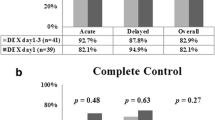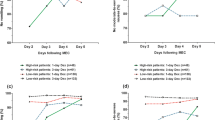Abstract
Uncertainty remains about the optimal anti-emetic regimen for control of delayed nausea and vomiting after adjuvant chemotherapy for breast cancer. Many patients receive dexamethasone but complain of insomnia, anxiety/agitation, and indigestion. The aim was to determine if patients receiving chemotherapy for breast cancer prefer treatment with dexamethasone or placebo for prophylaxis against delayed nausea and vomiting, and to compare quality of life (QOL) between the two treatments. In this randomized, double-blind, cross-over trial, we compared oral dexamethasone (4 mg twice daily for 2 days) versus placebo for chemotherapy-naïve patients with breast cancer. All patients received intravenous granisetron and dexamethasone pre-chemotherapy and oral granisetron on day 2. Primary endpoints were: (i) patient preference; (ii) difference between cycles in change of QOL from days 1 to 8. Median age of the 94 women was 51 years (range 27–76): 79 received fluorouracil/epirubicin/cyclophosphamide and 15 received doxorubicin/cyclophosphamide. Thirteen withdrew pre-cycle 2 with no differences between arms. Of 80 patients stating a preference, 31 preferred placebo (39 %, 95 % CI: 28–50 %) and 37 (46 %, 95 % CI: 35–58 %) preferred dexamethasone; 12 had no preference. There were no differences in intensity of vomiting, nausea, or time to onset of vomiting. There was greater decrease in global QOL (p = 0.06) when patients received dexamethasone. No other symptom/QOL domains differed significantly. In conclusion, no significant difference was found in patient preference, QOL, or symptoms regardless of whether dexamethasone or placebo was used after adjuvant chemotherapy.



Similar content being viewed by others
References
Hesketh PJ, Gralla RJ, du Bois A, Tonato M (1998) Methodology of antiemetic trials: response assessment, evaluation of new agents and definition of chemotherapy emetogenicity. Support Care Cancer 6(3):221–227
Roila F, Hesketh PJ, Herrstedt J (2006) Prevention of chemotherapy- and radiotherapy-induced emesis: results of the 2004 Perugia International Antiemetic Consensus Conference. Ann Oncol 17(1):20–28
Grunberg SM, Osoba D, Hesketh PJ, Gralla RJ, Borjeson S, Rapoport BL, du Bois A, Tonato M (2005) Evaluation of new antiemetic agents and definition of antineoplastic agent emetogenicity—an update. Support Care Cancer 13(2):80–84
Herrstedt J, Aapro MS, Roila F, Kataja VV (2005) ESMO minimum clinical recommendations for prophylaxis of chemotherapy-induced nausea and vomiting (NV). Ann Oncol 16(Suppl 1):i77–i79
MASCC/ESMO Antiemetic Guideline (2011) [http://data.memberclicks.com/site/mascc/MASCC_Guidelines_English_2011.pdf]
Basch E, Prestrud AA, Hesketh PJ, Kris MG, Feyer PC, Somerfield MR, Chesney M, Clark-Snow RA, Flaherty AM, Freundlich B et al (2011) Antiemetics: American Society of Clinical Oncology clinical practice guideline update. J Clin Oncol 29(31):4189–4198
Kris MG, Hesketh PJ, Herrstedt J, Rittenberg C, Einhorn LH, Grunberg S, Koeller J, Olver I, Borjeson S, Ballatori E (2005) Consensus proposals for the prevention of acute and delayed vomiting and nausea following high-emetic-risk chemotherapy. Support Care Cancer 13(2):85–96
Ettinger DS, Armstrong DK, Barbour S, Berger MJ, Bierman PJ, Bradbury B, Ellis G, Kirkegaard S, Kloth DD, Kris MG et al (2009) Antiemesis. Clinical Practice Guidelines in Oncology. J Natl Compr Canc Netw 7(5):572–595
Herrstedt J, Roila F (2009) Chemotherapy-induced nausea and vomiting: ESMO clinical recommendations for prophylaxis. Ann Oncol 20(Suppl 4):156–158
Ioannidis JP, Hesketh PJ, Lau J (2000) Contribution of dexamethasone to control of chemotherapy-induced nausea and vomiting: a meta-analysis of randomized evidence. J Clin Oncol 18(19):3409–3422
Lofters WS, Pater JL, Zee B, Dempsey E, Walde D, Moquin JP, Wilson K, Hoskins P, Guevin RM, Verma S et al (1997) Phase III double-blind comparison of dolasetron mesylate and ondansetron and an evaluation of the additive role of dexamethasone in the prevention of acute and delayed nausea and vomiting due to moderately emetogenic chemotherapy. J Clin Oncol 15(8):2966–2973
The Italian Group for Antiemetic Research (1995) Dexamethasone, granisetron, or both for the prevention of nausea and vomiting during chemotherapy for cancer. N Engl J Med 332(1):1–5
Smith DB, Newlands ES, Rustin GJ, Begent RH, Howells N, McQuade B, Bagshawe KD (1991) Comparison of ondansetron and ondansetron plus dexamethasone as antiemetic prophylaxis during cisplatin-containing chemotherapy. Lancet 338(8765):487–490
The Italian Group for Antiemetic Research (1997) Ondansetron versus metoclopramide, both combined with dexamethasone, in the prevention of cisplatin-induced delayed emesis. J Clin Oncol 15(1):124–130
Inoue A, Yamada Y, Matsumura Y, Shimada Y, Muro K, Gotoh M, Hamaguchi T, Mizuno T, Shirao K (2003) Randomized study of dexamethasone treatment for delayed emesis, anorexia and fatigue induced by irinotecan. Support Care Cancer 11(8):528–532
Silva RR, Bascioni R, Giorgi F, Acito L, Giustini L, De Signoribus G, Marcellini M, Menichetti ET, Giuliodori L (1996) Granisetron plus dexamethasone in moderately emetogenic chemotherapy: evaluation of activity during three consecutive courses of chemotherapy. Support Care Cancer 4(4):287–290
Celio L, Frustaci S, Denaro A, Buonadonna A, Ardizzoia A, Piazza E, Fabi A, Capobianco AM, Isa L, Cavanna L et al (2011) Palonosetron in combination with 1-day versus 3-day dexamethasone for prevention of nausea and vomiting following moderately emetogenic chemotherapy: a randomized, multicenter, phase III trial. Support Care Cancer 19(8):1217–1225
Aapro M, Fabi A, Nole F, Medici M, Steger G, Bachmann C, Roncoroni S, Roila F (2010) Double-blind, randomised, controlled study of the efficacy and tolerability of palonosetron plus dexamethasone for 1 day with or without dexamethasone on days 2 and 3 in the prevention of nausea and vomiting induced by moderately emetogenic chemotherapy. Ann Oncol 21(5):1083–1088
The Italian Group for Antiemetic Research (2004) Randomized, double-blind, dose-finding study of dexamethasone in preventing acute emesis induced by anthracyclines, carboplatin, or cyclophosphamide. J Clin Oncol 22(4):725–729
Adams M, Soukop M, Barley V, Yosef H, Anderson H, Boesen E, Trask CW, Rufenacht E, de Bruijn KM (1995) Tropisetron alone or in combination with dexamethasone for the prevention and treatment of emesis induced by non-cisplatin chemotherapy: a randomized trial. Anticancer Drugs 6(4):514–521
The Italian Group for Antiemetic Research (2000) Dexamethasone alone or in combination with ondansetron for the prevention of delayed nausea and vomiting induced by chemotherapy. N Engl J Med 342(21):1554–1559
Fauser AA, Fellhauer M, Hoffmann M, Link H, Schlimok G, Gralla RJ (1999) Guidelines for anti-emetic therapy: acute emesis. Eur J Cancer 35(3):361–370
Vardy J, Chiew KS, Galica J, Pond GR, Tannock IF (2006) Side effects associated with the use of dexamethasone for prophylaxis of delayed emesis after moderately emetogenic chemotherapy. Br J Cancer 94(7):1011–1015
Aaronson NK, Ahmedzai S, Bergman B, Bullinger M, Cull A, Duez NJ, Filiberti A, Flechtner H, Fleishman SB, de Haes JC et al (1993) The European Organization for Research and Treatment of Cancer QLQ-C30: a quality-of-life instrument for use in international clinical trials in oncology. J Natl Cancer Inst 85(5):365–376
O’Brien BJ, Rusthoven J, Rocchi A, Latreille J, Fine S, Vandenberg T, Laberge F (1993) Impact of chemotherapy-associated nausea and vomiting on patients’ functional status and on costs: survey of five Canadian centres. CMAJ 149(3):296–302
Lindley CM, Hirsch JD, O’Neill CV, Transau MC, Gilbert CS, Osterhaus JT (1992) Quality of life consequences of chemotherapy-induced emesis. Qual Life Res 1(5):331–340
Osoba D, Rodrigues G, Myles J, Zee B, Pater J (1998) Interpreting the significance of changes in health-related quality-of-life scores. J Clin Oncol 16(1):139–144
King MT (1996) The interpretation of scores from the EORTC quality of life questionnaire QLQ-C30. Qual Life Res 5(6):555–567
Hesketh PJ (2008) Chemotherapy-induced nausea and vomiting. N Engl J Med 358(23):2482–2494
Kris MG, Roila F, De Mulder PH, Marty M (1998) Delayed emesis following anticancer chemotherapy. Support Care Cancer 6(3):228–232
The Italian Group for Antiemetic Research (1997) Delayed emesis induced by moderately emetogenic chemotherapy: do we need to treat all patients? Ann Oncol 8(6):561–567
Osoba D, Zee B, Pater J, Warr D, Latreille J, Kaizer L (1997) Determinants of postchemotherapy nausea and vomiting in patients with cancer. Quality of life and Symptom Control Committees of the National Cancer Institute of Canada Clinical Trials Group. J Clin Oncol 15(1):116–123
Osoba D, Zee B, Warr D, Latreille J, Kaizer L, Pater J (1997) Effect of postchemotherapy nausea and vomiting on health-related quality of life. The Quality of life and Symptom Control Committees of the National Cancer Institute of Canada Clinical Trials Group. Support Care Cancer 5(4):307–313
Pater J, Osoba D, Zee B, Lofters W, Gore M, Dempsey E, Palmer M, Chin C (1998) Effects of altering the time of administration and the time frame of quality of life assessments in clinical trials: an example using the EORTC QLQ-C30 in a large anti-emetic trial. Qual Life Res 7(3):273–278
Rusthoven JJ, Osoba D, Butts CA, Yelle L, Findlay H, Grenville A (1998) The impact of postchemotherapy nausea and vomiting on quality of life after moderately emetogenic chemotherapy. Support Care Cancer 6(4):389–395
Kris MG, Hesketh PJ, Somerfield MR, Feyer P, Clark-Snow R, Koeller JM, Morrow GR, Chinnery LW, Chesney MJ, Gralla RJ et al (2006) American Society of Clinical Oncology guideline for antiemetics in oncology: update 2006. J Clin Oncol 24(18):2932–2947
NCCN Clinical Practice Guidelines in Oncology Antiemesis [http://www.nccn.org/professionals/physician_gls/pdf/antiemesis.pdf]
Hatoum HT, Lin SJ, Buchner D, Cox D (2012) Comparative clinical effectiveness of various 5-HT(3) RA antiemetic regimens on chemotherapy-induced nausea and vomiting associated with hospital and emergency department visits in real world practice. Support Care Cancer 20(5):941–949
American Society of Clinical Oncology (2007) Quality oncology practice initiative registration surpasses 250 oncology practices: spring 2007 data collection provides data to drive practitioner-led improvement. J Oncol Pract 3(5):271–273
Acknowledgments
Oliveira Jugovic, research co-ordinator from Mt Sinai Hospital, for recruitment and collection of data.
Financial disclosures
Dr. Warr is on Advisory Boards for Esai and Merck and on Merck’s Speakers Bureau. The remaining authors have no disclosures to declare.
Author information
Authors and Affiliations
Corresponding author
Rights and permissions
About this article
Cite this article
Vardy, J., Pond, G., Dodd, A. et al. A randomized double-blind placebo-controlled cross-over trial of the impact on quality of life of continuing dexamethasone beyond 24 h following adjuvant chemotherapy for breast cancer. Breast Cancer Res Treat 136, 143–151 (2012). https://doi.org/10.1007/s10549-012-2205-3
Received:
Accepted:
Published:
Issue Date:
DOI: https://doi.org/10.1007/s10549-012-2205-3




